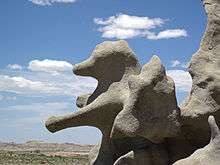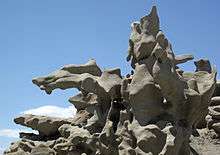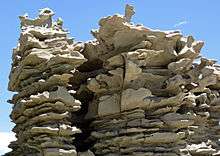Fantasy Canyon
Fantasy Canyon is a Bureau of Land Management-managed area located about 27 miles (43 km) south of Vernal, in Uintah County, Utah. Even though the area is only about 10 acres (40,000 m2) in size, it contains some of the most unusual geologic features in the world. The site was officially documented by early explorer and paleontologist Earl Douglass, who recorded the area by other names such as “The Devil’s Playground” and “Hades Pit.” He published photographs of this area in a 1909 publication called “The Columbian Magazine.”



Geology
The rocks of Fantasy Canyon, quartzose sandstones, were deposited during the Eocene Epoch. They date from around 38 to 50 million years ago. During the geologic period, the Uinta Basin was occupied by a large lake called Lake Uinta. The lake extended 120 miles (190 km) west to Heber City, 30 miles (48 km) east to Rangely, Colorado, south to the Book Cliff Divide, north to the Uinta Mountains, and was about a half mile deep.
Stratigraphy: member C, Uinta Formation, Eocene.
Fantasy Canyon is along the east shore of what was once Lake Uinta, where the sediments eroded from the surrounding high lands. Sediments were deposited and the once loose sands, silts, and clays were forged into sandstone and shale. Because of different rates of weathering, the more durable sandstone remained while the more easily weathered siltstone and shale washed away, yielding this spectacular scenery. Today’s geologic formations of Fantasy Canyon will eventually give way to weather and then topple and erode into sand, but new formations will appear as the topsoil washes away. Because the delicate formations are so fragile the area is referred to as “Nature’s China Shop.”
Mineralization
There are black ribbons of coal-like material along the small washes on the trail or as horizontal stripes in the rocks. This magnetic material is called magnetite (iron oxide).
There are inch-wide, black-colored, subvertical, northwest-southeast trending gilsonite dikes that have intruded the rocks at Fantasy Canyon. Gilsonite, named after U.S. Marshall Samuel H. Gilson, is a type of asphaltite - solidified hydrocarbons. Gilsonite was discovered in the early 1860s. Starting in the mid-1880s, Gilson promoted the material as a waterproof coating for wooden pilings, as an insulation for wire cable, and as a unique varnish.
Fossils
The Eocene-aged Uinta Formation is fossiliferous. It contains widely scattered bones, mostly mammals, which roamed the Basin during the Eocene. Fossilized turtle shells are visible in the area.
References
External links
| Wikimedia Commons has media related to Fantasy Canyon. |
- Photo Gallery from Fantasy Canyon. Includes notes by the geologist-photographer.